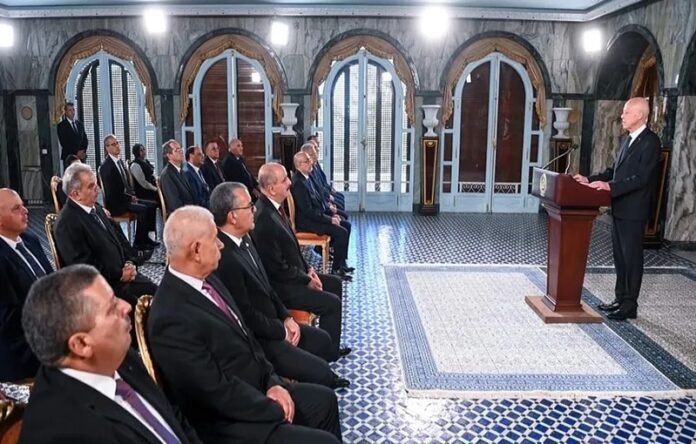In an unexpected move, Tunisian President Kais Saied conducted a significant cabinet reshuffle just 40 days before the upcoming presidential elections scheduled for October 6th. This reshuffle comes amidst ongoing political tensions that have gripped the country since 2021, with growing accusations against the president of undermining democracy by excluding most prominent opposition figures from the electoral scene. But what are the real motivations behind this cabinet reshuffle? What messages is Kais Saied trying to convey through this step at such a critical time?
Stated Reasons for the Reshuffle: Are They Sufficient?
President Saied justified the cabinet reshuffle as necessary due to the paralysis of “state machinery,” attacking critics who viewed the move as an attempt to bolster his electoral position, labeling them as “slanderers.” But are these justifications sufficient to warrant a reshuffle involving 19 ministers and 3 state secretaries? Was this reshuffle genuinely necessary to improve government performance, or is it an attempt to consolidate power ahead of the elections?
Impact on the Political Scene: A Step Toward Stability or Deepening Division?
The reshuffle, which affected key ministries such as Defense and Foreign Affairs, sparked widespread criticism from various political factions. Some politicians believe that Kais Saied is seeking to impose a policy of fait accompli, further deepening political divisions in the country. Can this reshuffle genuinely improve government performance, or will it only exacerbate polarization and worsen the political crisis?
Frequent Cabinet Changes: Indication of Policy Failure or Necessary Course Correction?
Since the dismissal of Hichem Mechichi’s government on July 25, 2021, Tunisia has seen the appointment of three successive prime ministers, with each change accompanied by the president’s assertion that executive power is exercised with the help of a government led by a prime minister. This recurring cabinet reshuffling raises questions about the effectiveness of these policies. Do these frequent changes reflect the failure of government policies, or are they sincere attempts to correct the course and ensure stability?
Timing of the Reshuffle: Electoral Maneuver or Necessary Step?
The timing of Kais Saied’s cabinet reshuffle, just 40 days before the elections, raises many questions about his motivations. Is the president aiming to improve his electoral chances by removing ministers deemed ineffective? Should this reshuffle be seen as a step to improve the government’s image ahead of the elections, or is it an attempt to exploit power to strengthen his political position?
Political Reactions: Widespread Rejection and Fears of Consolidating Individual Rule
The cabinet reshuffle was met with negative reactions from various political factions. Politician Khaled Chouket believes that the reshuffle reinforces the belief that Saied does not intend to relinquish power or allow a peaceful transition. Ennahda leader Belkacem Hassan sees the reshuffle as part of the “coup government” policy aimed at consolidating individual rule and excluding the opposition. Can this reshuffle truly improve government performance, or is it another step toward consolidating individual rule?
Future Implications: Can This Reshuffle Influence Election Results?
As the elections approach, observers are questioning the impact of this cabinet reshuffle on the anticipated results. Can it help boost Kais Saied’s chances of securing a new presidential term? Will the reshuffle contribute to calming the political situation in Tunisia, or will it lead to an escalation of tensions?




